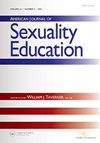Perceptions of Children’s Age-Appropriate and Problematic Sexual Behaviors Among Adults Living in the United States
IF 1.1
Q2 EDUCATION & EDUCATIONAL RESEARCH
引用次数: 1
Abstract
Abstract The present study examined how adults living in the United States perceive children’s developmentally-appropriate and problematic sexual behaviors before and after receiving psychoeducation on these topics. The purpose of the present study was to inform future psychoeducational programming. The present study specifically focused on whether male and female adult participants experienced biases regarding children’s sexual behaviors based on their own genders, children’s genders, and their own histories of adverse sexual experiences during childhood (ASECs). Participants from a national sample were presented with 8 vignettes describing situations in which male children (4 vignettes) and female children (4 vignettes) engaged in developmentally-appropriate childhood sexual behaviors (CSBs) and problematic sexual behaviors (PSBs). Participants were then asked to rate how likely they were to recommend that the children’s families seek services for CSBs and PSBs, before and after receiving psychoeducation. Results showed that the likelihood of female participants and participants with histories of ASECs recommending that families seek services significantly differed (p < .05) from male participants and participants without histories of ASECs—both overall and contextually. Additional research is warranted on how to effectively disseminate information about CSBs and PSBs to adult females as well as with histories of ASECs.美国成年人对儿童适龄性行为和问题性行为的认知
摘要本研究调查了生活在美国的成年人在接受有关这些主题的心理教育前后如何看待儿童的适合发展和有问题的性行为。本研究的目的是为未来的心理教育节目提供信息。本研究特别关注男性和女性成年参与者是否根据自己的性别、儿童的性别以及自己在童年时期的不良性经历史(ASEC)对儿童的性行为产生偏见。来自全国样本的参与者收到了8个小插曲,描述了男性儿童(4个小插曲)和女性儿童(4个子插曲)参与适合发展的儿童性行为(CSBs)和有问题的性行为(PSBs)的情况。然后,参与者被要求对他们在接受心理教育之前和之后建议孩子的家人寻求CSB和PSB服务的可能性进行评分。结果显示,女性参与者和有ASEC病史的参与者建议家庭寻求服务的可能性与男性参与者和没有ASEC病史参与者在总体和背景上存在显著差异(p<0.05)。需要进一步研究如何有效地向成年女性以及有ASEC病史的女性传播关于CSBs和PSBs的信息。
本文章由计算机程序翻译,如有差异,请以英文原文为准。
求助全文
约1分钟内获得全文
求助全文
来源期刊

American Journal of Sexuality Education
EDUCATION & EDUCATIONAL RESEARCH-
CiteScore
2.40
自引率
8.30%
发文量
39
期刊介绍:
The American Journal of Sexuality Education speaks directly to the distinct, professional needs of sexuality educators and trainers. This peer-reviewed journal provides sexuality educators and trainers with current research about sexuality education programming, best practices, sample lesson plans, reports on curriculum development and assessment, literature reviews, scholarly commentary, educational program reports, media reviews (books, videos, internet resources, and curricula), and letters to the editor. The American Journal of Sexuality Education addresses a variety of sexuality topics and audiences, presenting up-to-date theory and practice, lessons, and evaluations.
 求助内容:
求助内容: 应助结果提醒方式:
应助结果提醒方式:


